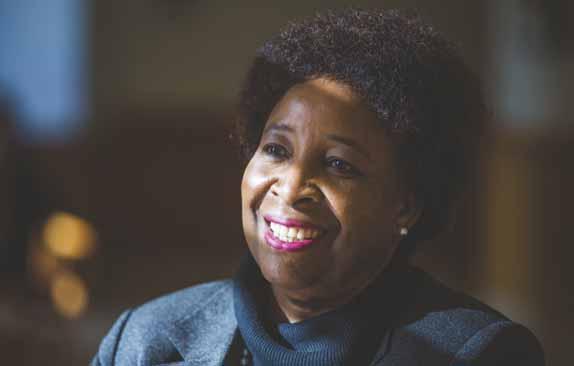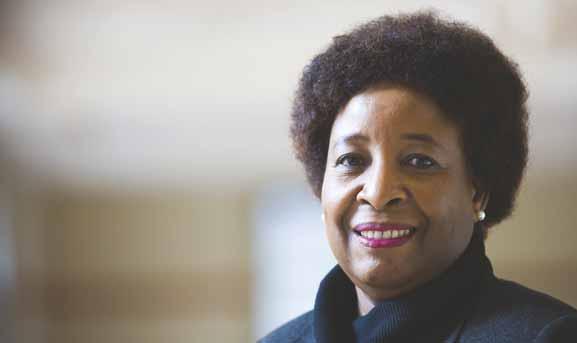
6 minute read
From Gabarone to Emory and Back
TO BOTSWANA TO BOTSWANA WITH LOVEWITH LOVE
By Pam Auchmutey Photography by Kay Hinton
Mabel Magowe
Emory is a long way from a third-grade classroom in Botswana, where a young Mabel Magowe told her teacher that she wanted to be a nurse. Several decades later, Magowe 08PhD MSc BEd has gone far beyond her childhood goal, serving as a leader, researcher, and professor for generations of new nurses and midwives across Africa.

Now deputy dean of the health sciences faculty and senior lecturer and coordinator of HIV/AIDS education at the University of Botswana, Magowe was recently awarded the prestigious Sheth Distinguished International Alumni Award, presented by Emory’s Office of Global Strategy and Initiatives.
The annual award—established by Madhu and Jagdish Sheth, Charles H. Kellstadt Professor of Marketing at Goizueta Business School, nearly 20 years ago—recognizes alumni from other countries for outstanding contributions to humanity, art, science, or human welfare.
Magowe was honored earlier this year for her efforts to advance nursing practice, education, and workforce development in Botswana. She has practiced and taught midwifery; served on government policy task forces; developed family planning policies, procedure manuals, and midwifery curricula; created a national program to prevent mother-to-child HIV transmission; educated nurses in South Africa, Zimbabwe, and Tanzania; and collaborated on research in Africa and the United States.


The award ceremony brought Magowe back to Emory, where she also spoke to School of Nursing students as part of the Nursing Now speaker series, hosted by the Lillian Carter Center for Global Health and Social Responsibility. The Nursing Now campaign, sponsored by the World Health Organization (WHO) and the International Council of Nurses, seeks to raise the status of nurses and nurse-midwives worldwide.
“This is my home away from home,” Magowe told her audience, which included classmates and faculty with whom she studied as a PhD student beginning in 2003.
Throughout her career, she’s been blessed with strong role models, beginning with her mother, a widow who imbued her 10 children with a strong sense of responsibility, and her aunt and a family friend, both of whom were nurses. “These ladies were my best examples because they used to nurse in a business-like, graceful manner and knew exactly what they were doing,” Magowe said.
She began her nursing education at age 19 (her mother had to grant permission because she was so young) and subsequently learned to practice and teach midwifery, driven by a national need for clinicians and instructors in the specialty.
“I learned how to teach very early,” she says. She also learned how to care for pregnant women by listening and touching.
“I once attended an exchange program in the UK, where I accompanied a midwife,” Magowe adds. “She was querying whether a patient was a transverse lie (when a baby is in breech position) and wanted to confirm it with an ultrasound. I told her, ‘Look at the abdomen first. Just feel the head here—it’s transverse.’ The midwife got an ultrasound to confirm it. In my country, we use our hands. But technology is influencing how we practice nursing, and we have a long way to go to catch up.”
Botswana’s universal health care system relies heavily on nurses to provide essential services at various levels—from satellite clinics, health posts, and maternity clinics in villages and small communities to district and federal hospitals in larger towns and cities. As a midwife who first taught at a district hospital in 1980, Magowe began to see the difficulties women faced in talking with their partners about safe sex to prevent HIV/AIDS infection, a problem she would later study at Emory.
In fall 2001, Magowe traveled to Atlanta to attend the Lillian Carter Center’s first conference. Led by Marla Salmon, then dean of nursing, the conference brought 300 nursing leaders from more than 50 countries together to form partnerships that would strengthen the nursing workforce and health care system in their respective countries. At the time, Magowe was president of the National Nurses Association of Botswana, one of the very leaders whom the conference targeted.
The meeting included a tour of the School of Nursing, where Magowe learned about its doctoral program for nursing scientists. “I went home and asked for a release from the University of Botswana to do a PhD,” Magowe remembers. She also obtained a Fulbright Fellowship to help support her doctoral studies, built around developing



a model for safe sex communication between women and their partners in Botswana. After five years of study, Magowe received her PhD in 2008.
“When I returned home, I could work independently,” Magowe says. “I didn’t have to rely on someone else to do basic research. I was on my own.”
Her body of research on HIV/AIDS prevention and improving women’s health has flourished, based on collaborations in Botswana and with partners like the Centers for Disease Control and Prevention (CDC) in the U.S. She remains an ardent member of the QUAD, a nickname coined by members of the African Health Profession Regulatory Collaborative for Nurses and Midwives (ARC). Established in 2012 by Emory’s Maureen Kelley PhD CNM FACNM, now emeritus professor, ARC has helped nursing leaders in 17 African countries strengthen regulation around sustainable nurse-initiated and nurse-managed HIV treatment. Although CDC support for ARC has ended, the QUADs continue to thrive on their own. The Botswana QUAD includes the president of the National Nurses Association, the registrar of the Nursing and Midwifery Council, the chief nursing officer, and Magowe, the adviser for research.
“ARC has been a pillar of strength in our countries,” says Magowe. “When we were working to define scope of practice in Botswana, we included family nurse practitioners, midwives, pediatrics nurses, and other nurses, so we called them the QUADplus. We extend the QUAD as needed to work on different aspects


of nursing practice and regulation. That is how we do things in Botswana. We no longer work in siloes.”
Like their colleagues around the world, the Botswana QUAD has embraced the International Year of the Nurse and Midwife, the 2020 campaign sponsored by the WHO. On May 12, the 200th anniversary of the birth of Florence Nightingale, Botswana nursing leaders unveiled their first-ever nurse and midwifery strategy. Among its goals: improving nursing education and research, strengthening regulation and collaboration, and building the nursing workforce.
The new strategy comes at a time when the African nation’s nursing workforce is growing. “There were years when we had a lot of migration of nurses to developed countries,” Magowe says. “Now there is in-migration of nurses working on projects in Botswana. They are applying for research positions funded by U-Penn, Harvard, and the University of Maryland. Many highly trained nurses are applying for those positions. And more and more nurses are working in private hospitals.”
Four decades ago, one of Magowe’s first hospital patients was an elderly woman, whom she fed, bathed, and sat with in a surgical ward. She felt a strong bond with her. When Magowe returned one morning, her patient’s bed was empty—she had died.
“That has stayed with me for a long time,” Magowe says gently. “Compassion is always important, even if it comes with sadness at times. That’s the key to nursing.”





